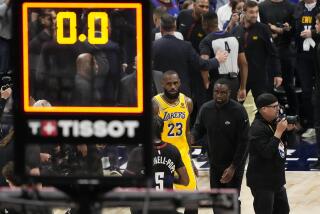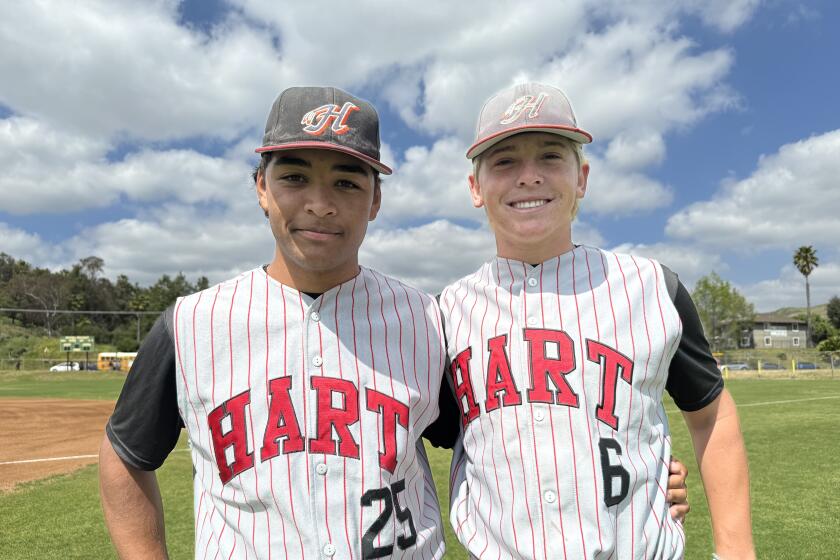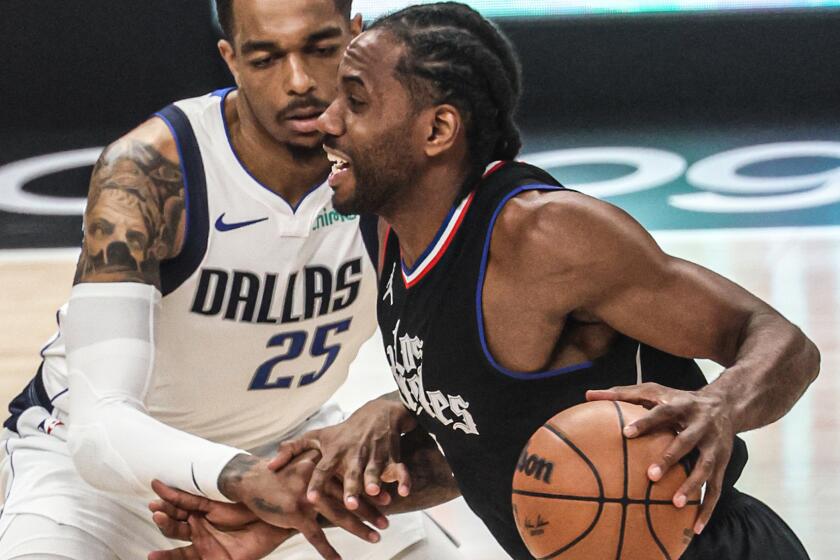Huddle Up
A few years ago, as the Denver Broncos were beating up on the Atlanta Falcons in Super Bowl XXXIII, Roderick Wright found himself in a Miami stadium suite with NFL Commissioner Paul Tagliabue and Carolina Panther owner Jerry Richardson.
The conversation focused on Los Angeles Memorial Coliseum, a fixture in Exposition Park for some 80 years, and whether the timeworn stadium had a big-league future.
“What Tagliabue said to me was, ‘I don’t have a problem with the Coliseum.’ His concern wasn’t the building itself,” recalled Wright, then a California assemblyman. “It was the governance -- the way the building was being handled.”
Nearly seven years later -- as the NFL considers a return to the Los Angeles area -- the Coliseum Commission is apparently back in the league’s good graces, marking a significant turnaround for a quarrelsome government body long known for fumbling away tenants and business.
The shift comes as the commission possibly faces a future of self-imposed irrelevance. If a deal with the NFL is reached, plans call for the panel to cede control of the Coliseum to the league, surrendering much of the power it has wielded -- many would say mishandled -- over the last 50 years in reshaping the Los Angeles sports landscape.
Once upon a time, the Rams played at the Coliseum, leaving in 1980 in part because of differences with the commission. The Raiders arrived in their wake in 1982 and teamed with the commission to beat the NFL in an antitrust case, only to return to Oakland after the 1994 season, partly because of dissatisfaction with the Coliseum’s lack of amenities.
UCLA jumped to the Rose Bowl, alleging shoddy treatment by commissioners. Jack Kent Cooke built the Forum rather than deal with them.
Before Dodger Stadium was built, the Dodgers had to endure commissioners’ suggestions about such matters as where to place home plate at the Coliseum.
Even next-door neighbor USC seriously thought about leaving in the early 1980s amid a dispute with commissioners who seemed intent upon luring an NFL team at any cost.
But that was then, says investment banker Bill Chadwick, president of the nine-member commission. In remarks echoed by NFL officials, he says the reality now is that the current panel has proved itself different -- valuing compromise and collegiality over partisanship or personal agendas.
“I’m not saying there aren’t skeptics,” Chadwick said. “But I think our deeds, our words and our actions have convinced [the NFL] that this is a Coliseum Commission truly committed to bringing an NFL team to Exposition Park.”
Added county Supervisor Zev Yaroslavsky, who sits on the commission: “It’s a different animal. Seeing is believing.”
Sacramento seems to be saying the same thing, with Gov. Arnold Schwarzenegger telegraphing his desire to get a deal done.
Last year, Schwarzenegger signed legislation to help lower the cost of financing infrastructure improvements by an estimated $25 million to $30 million -- though providing no taxpayer money for improvements inside the stadium -- if the NFL leased the historic site. He said that the “special circumstance to attract an NFL franchise to California is extremely unique and important.”
The governor’s will has been evident in shaping the commission lineup. He took a personal interest in the appointment of David Israel, a well-connected television producer and former sports columnist.
He also retained commission President Chadwick, a Gray Davis appointee in 2001 who is a lead negotiator in the current talks with the league. Chadwick served as Davis’ negotiator when Los Angeles tried to secure an expansion team in 1999. He resigned amid criticism from local and NFL officials as that effort unexpectedly faltered, overtaken by Houston businessman Bob McNair’s staggering $1.25-billion bid.
“What’s been helpful is that there are those on the commission who went through 1999 believing there was a team on the forefront and then found out there wasn’t,” said commission member Bernard Parks, a Los Angeles city councilman. “History has been helpful in defining the future.”
Assemblyman Mark Ridley-Thomas (D-Los Angeles), a longtime Coliseum proponent, said he believes an NFL deal is within reach. “This commission understands that not to have a state-of-the-art venue at the Coliseum has become a non-starter,” he said. “The previous commissions really didn’t get that.”
But many uncertainties remain about the NFL’s plans for the Los Angeles area, including when, or even if, the league will choose a site, whether the new arrival would be an expansion team or a transplant, and who would own it. A new wrinkle involves questions about the future of the New Orleans Saints -- long rumored to be a candidate for Los Angeles -- after Hurricane Katrina devastated their city and severely damaged the Louisiana Superdome.
Greg Aiello, an NFL spokesman, said Wednesday that the situation in New Orleans has nothing to do with the league’s ongoing negotiations in Southern California.
“It’s not affecting anything ... our team is doing in terms of negotiating agreements with the Coliseum and Anaheim, which we’re doing now,” he said.
Known for playing bidders against one another, the league is negotiating with Los Angeles and Anaheim on non-binding “term sheets,” while it continues to monitor the Pasadena situation despite a key City Council vote against revamping the Rose Bowl.
Details of the NFL-Coliseum negotiations remain closely held, though key deal points figure to include the amount of rent to be paid to the state, how parking revenue ought to be allocated and consideration of naming rights for the historic stadium.
The league’s aim, said Neil Glat, the NFL’s vice president for strategic planning, is to present term sheets from the Coliseum and Anaheim to owners when they meet in late October.
Owners could pick a site then. Tagliabue has said many times that returning to L.A. is a priority, both to reestablish a presence and to create a prime Super Bowl venue. Or, with a number of key finance-related issues looming on the league agenda, including revenue sharing and a new collective bargaining agreement, they could put off a decision.
“We have found it to be a very positive relationship. It’s been collaborative,” Glat said, referring to recent dealings with the commission. “We’ve encountered issues that require compromise and mutual solution and been able to do so. They, and we, have been very forthcoming in trying to arrive at an amicable deal for both parties.”
Glat and other NFL staffers met Wednesday over lunch with Coliseum officials. Meetings are scheduled today between the NFL and Anaheim.
After Wednesday’s session, Glat said the league remains “on target to have all the deals negotiated by October.”
He said of the Coliseum that “there are a fair amount of documents to do in a transaction of this complexity. But so far, no snags -- so far, so good.”
The NFL has also signaled that the Coliseum site is no longer taboo territory, as some owners viewed it during the Raider era.
The league recently shot a Super Bowl XL commercial at the stadium, site of the first Super Bowl in 1967. One of three concerts kicking off the NFL season is scheduled there today, featuring controversial rap artist Kanye West.
It is a somewhat different Exposition Park from the one the Raiders left, starting with the California Science Center, which opened in 1998 and draws 1.3 million visitors a year.
“We used to come down to the park when I was in high school. I remember the gangs being big -- they told us not to wear certain color T-shirts. I remember the transients coming up and bugging us while we were eating our lunch,” Elizabeth Van Kirk, 28, of Tehachapi, Calif., said while visiting the park and the Science Center last week with daughters, Allison, 4, and Grace, 6. “I haven’t worried about any of those things at all, all day.”
Her mother, Beverly Ryder, 54, of Mojave, added: “We just wouldn’t come here if the Raiders were still here.”
The commission operates amid an array of parties with an interest in the 160-acre park. Its structure is complicated, and its workings have traditionally invited rivalry.
The city, county and state each has three representatives on the commission.
“It can be very difficult at times because the best thing for the Coliseum and the public may not be the best thing for [City Hall],” said lawyer and lobbyist Lisa Specht, a former commission president.
The state owns the land under the Coliseum, with the Science Center board acting as landlord. The three state representatives on the Coliseum Commission -- Chadwick, Israel and Fabian R. Wesson, the wife of former state Assembly Speaker Herb Wesson -- also serve on the Science Center board, the overlapping directorships giving them considerable clout. The commission is a tenant; its power stems from a lease signed 50 years ago.
Annual rent is $80,000 -- $50,000 for the Coliseum, $30,000 for the Sports Arena -- an amount that has remained unchanged for decades, galling critics who say the state should receive far more.
In September 2003, the panel exercised an option to extend its original 50-year lease for 49 years; the extension is due to run from Jan. 1, 2006, through Dec. 31, 2054. The rent, however, has not yet been set.
Last year, the commission told state legislators that luring the NFL back to the Coliseum could boost annual lease revenue to $2.5 million or more, though Assembly analysts noted that the figure was only an estimate. Rent has emerged as perhaps the toughest negotiating point with the NFL, several people close to the talks said.
Parking, too, has proved problematic. By law, any parking fees collected in Exposition Park are to be deposited in a fund that is used to maintain and improve the park -- probably not the focus of a profit-conscious franchise owner.
“Anything that has to do with money is complicated. It just is,” Chadwick said. “It will all get negotiated.”
Having dropped demands for public stadium funds, the NFL would contribute $500 million or more toward refurbishing the Coliseum, a makeover that would include luxury boxes, restaurants and clubs.
In return, the commission would essentially bench itself, handing over control of the stadium to the league. It also would affect General Manager Patrick T. Lynch’s $250,000 salary. “I’ll end up wherever I end up,” he said.
The commission probably would not disappear, Chadwick said, but would move into the background, probably as a “public ombudsman” with the ability to be “constantly vigilant over the uses of the park.”
Any deal the Coliseum Commission may strike with the NFL must also pass muster with the Science Center board and California’s State and Consumer Services Agency, which is charged with providing policy and fiscal oversight for Exposition Park.
“I feel very strongly, and I’ve voiced my concern and I don’t think anyone disagrees with me, that what is going on here has to be, at the end of the day, completely transparent,” Chadwick said, citing the need for support from such diverse parties as the state, city, county, downtown redevelopment backers, park-goers and football fans.
“I think anybody that thinks differently is somewhat naive,” he said.
Chadwick also acknowledged that a single powerful interest could prove a stumbling block. But no such opposition has surfaced so far.
Mayor Antonio Villaraigosa made headlines last month in reiterating the position of a number of mayors before him -- opposition to using public money to woo a team -- but his chief of staff, Robin Kramer, emphasized in an interview that the mayor “intends to be a leader and a good partner in this effort.”
Former Gov. George Deukmejian, who serves as chairman of the Science Center’s nonprofit foundation, said it is important that if an NFL team takes over, “the other activities in Exposition Park are not affected.”
Former Assemblyman Wright, who like many others supports the NFL’s return without public money, expressed concern about park occupants such as the California African American Museum and Natural History Museum.
“It’s not how the California Science Center and the museums work with football but how football works with them,” he said. “The museums bring over 2 million people into the park every year. They come first.”
True enough, Chadwick said: “Just having football in and of itself, if it doesn’t help the rest of Exposition Park, it’s not a very good-value proposition.”
That said, “If I can cause more activity in the [park] that doesn’t negatively impact the other venues, I would argue that more activity should benefit everybody.”
USC, for its part, has “full confidence that we will be playing there for another 80 years or more,” Michelle McCarthy, the university’s senior associate vice president, said in a statement. The university is “hopeful” an agreement would benefit “the park, the city and county of Los Angeles [and] the state of California,” she said.
Olympic boosters also have an interest in what happens to the Coliseum, which has played host to two Summer Games and figures to be an integral part of a third. Los Angeles organizers unveiled plans Wednesday to seek the 2016 bid; a vote on the site is scheduled for 2009.
“At some point, society in California, the powers that be, have to make a decision: Is it like the Roman Colosseum? You bring in tours, you say, ‘The Rams and Trojans used to play here ... ,’ ” Yaroslavsky said. “The question now is, do you want the Coliseum to continue to be a viable venue for modern sports or a historic relic?”
*
(BEGIN TEXT OF INFOBOX)
Tenants
Seasons four major teams have called the Coliseum home:
RAIDERS
1982-1994
RAMS
1946-1979
UCLA
1929-1981
USC
1923-Present
*
History lesson
Key dates for the Los Angeles Memorial Coliseum:
* 1923: The Coliseum, built at a cost of $954,873, opens in May. Its first college football game, Pomona College at USC, is played in October, drawing 12,836 fans.
* 1932: The Olympic opening ceremony and track and field competition are held; the stadium is enlarged to hold 101,574 fans.
* 1946: The Rams move to Los Angeles from Cleveland.
* 1955: The Coliseum Commission is created to issue bonds needed to finance and build the Los Angeles Sports Arena. The commission signs a 50-year lease on Jan. 3, 1956, to operate the Coliseum and the proposed arena. The original lease includes a prohibition against selling “malt, vinous or spirituous alcoholic liquors upon the said premises.”
* 1959: Vice President Richard Nixon dedicates the Los Angeles Memorial Sports Arena, a state-of-the-art venue built for $7.4 million.
* 1960: Robert Short moves the Minneapolis Lakers to the Sports Arena.
* 1963: The Coliseum plays host to its largest crowd when 134,254 people attend a Billy Graham religious assembly.
* 1967: Having acquired the Lakers two years before, Jack Kent Cooke moves the team along with the expansion Los Angeles Kings to his newly constructed Forum in Inglewood after feuding with the Coliseum Commission.
* 1980: The Rams leave for Anaheim Stadium in a dispute with the Coliseum Commission.
* 1981: UCLA moves to the Rose Bowl after a dispute with the commission over its effort to lure the Raiders from Oakland. “I thought the Coliseum Commission was being foolish, that it was being snookered by Al Davis, who was pretty good at snookering,” said former UCLA Chancellor Charles Young.
* 1982: The Raiders move to Los Angeles.
* 1984: The Coliseum plays host to its second Olympic Games. The stadium is declared a state and federal historical landmark.
* 1986: A federal appeals court unanimously upholds a lower court antitrust decision that awards the Coliseum Commission $14.6 million in damages resulting from the NFL’s attempt to keep the Raiders from moving to Los Angeles.
* 1995: After considering moving to Hollywood Park and Irwindale, the Raiders return to Oakland.
* 1999: The Los Angeles Clippers leave the Sports Arena for Staples Center.
* 1999: Houston outbids Los Angeles for an NFL expansion franchise.
* 2006: Sports Arena tenant USC is scheduled to move into a new university-owned basketball arena across the street from campus.
Sources: Los Angeles Sports Council and The Times
*
The commission
The Coliseum Commission has nine members, three each representing the state, city and county. Commission members receive no salary; the only perks are four free tickets to USC football games, preferred parking and access to a hospitality tent. The commission members are:
CITY
* Bernard Parks: Los Angeles city councilman whose district includes Exposition Park. The former police chief was appointed by council President Alex Padilla.
* Christopher Hammond: real estate developer.
* Candy Spelling: businesswoman, volunteer and the wife of television producer Aaron Spelling. Hammond and Spelling were appointed by the city’s Department of Parks and Recreation, whose board is appointed by the mayor.
COUNTY
* Yvonne Brathwaite Burke: county supervisor.
* Don Knabe: county supervisor.
* Zev Yaroslavsky: county supervisor.
STATE
* Bill Chadwick: investment banker; commission president.
* David Israel: television producer and former sports columnist.
* Fabian R. Wesson: wife of former Assembly Speaker Herb Wesson.
Note: Each is appointed by the governor to the California Science Center’s board of directors. In turn, that board votes three from its membership to the Coliseum Commission.
-- Alan Abrahamson
More to Read
Get our high school sports newsletter
Prep Rally is devoted to the SoCal high school sports experience, bringing you scores, stories and a behind-the-scenes look at what makes prep sports so popular.
You may occasionally receive promotional content from the Los Angeles Times.






